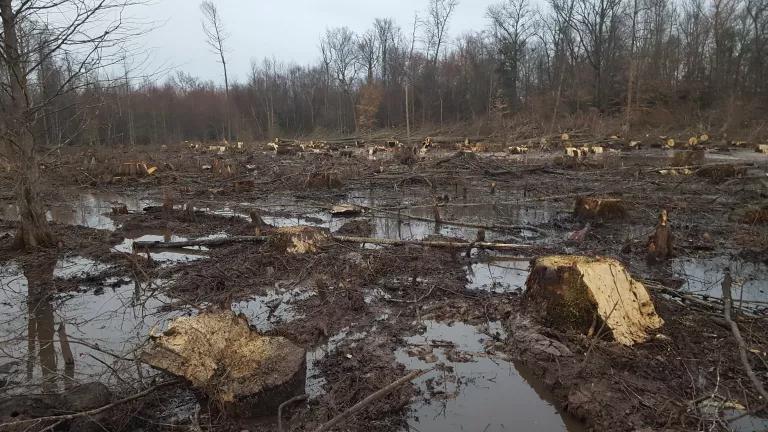
2018 Channel 4 investigation of forest clearcut for bioenergy by Enviva in Southhampton, Virginia
(C) Dogwood Alliance
Enviva—the world’s largest manufacturer of wood pellets to be burned for bioenergy—announced some uncertainty about its future on a quarterly shareholder call week. The company, which lost almost $100 million dollars in its 3rd quarter and is facing contractual and operational challenges, projects even greater losses next quarter. The company’s stock prices have fallen to below $1 from a high of $91 in April of 2022.
Of course, this kind of downfall shouldn’t be surprising for a company whose business model requires harming communities, breaking laws, and clearcutting forests. For years, Enviva has ravaged forests in the U.S. Southeast, converted them into pellets, and shipped them to countries that have deemed bioenergy “renewable” to burn for energy. While Enviva claims they rely on the “wastes and residues” of logging operations for wood pellets, investigations show that they routinely take whole trees from mature forests.
Enviva’s pellets mills, which are often located in environmental justice communities, emit scores of dangerous pollutants like particulate matter into the air, harming the health of community members. Despite the lax limits for these plants, Enviva has chalked up Clean Air Act violations in the name of profit. Indeed, since 2017, Enviva’s North Carolina facilities alone have tallied 14 air quality violations N.C. Department of Environmental Quality records (see also here).
The situation is a cautionary tale for countries that have classified woody biomass as “renewable” and are increasingly relying on it to meet net zero goals, as well as ones that haven’t gone that far but are constantly being lobbied to do so. The science though, is clear: Biomass energy is highly polluting at every step of the process, from the logging of trees, to the production of pellets, to the overseas transport, to the burning of the pellets (see also here).
The UK has bought into the idea of woody biomass as “renewable,” making it a central part of its energy portfolio and plans to meet net zero goals. Enviva’s collapse should make the UK second-guess these plans, given it puts the reliability of wood pellets into serious question. The UK has already acknowledged that it may only have access to just over half of the biomass its biomass strategy requires. Further, the UK, where energy prices are the highest in the world, is desperate for energy security. Enviva’s troubles show that woody biomass won’t provide it.
This story should also give U.S. decisionmakers pause. Enviva, Drax, and other bioenergy companies are lobbying for subsidies intended for true renewables (e.g., wind, solar). This time is no different. Enviva is hoping for a bailout and has applied to the Department of Energy for Inflation Reduction Act (IRA) subsidies intended for genuine clean energy sources (e.g., wind, solar)—something the Department should swiftly reject.
The fact that the largest biomass pellet manufacturer in the world is struggling says a lot about Enviva. But it says even more about bioenergy itself. This is an industry that can only operate at scale if countries continue to perpetuate the myth that it’s zero carbon and provide subsidies, and if its suppliers clearcut forests and pollute communities.
In other words, there is no way to create bioenergy at scale without harming people and the planet.




